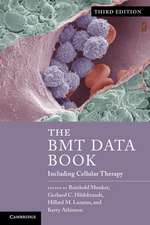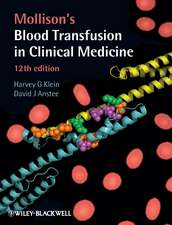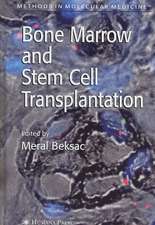Developmental Hematopoiesis: Methods and Protocols: Methods in Molecular Medicine, cartea 105
Editat de Margaret H. Baronen Limba Engleză Hardback – 15 oct 2004
| Toate formatele și edițiile | Preț | Express |
|---|---|---|
| Paperback (1) | 1103.22 lei 6-8 săpt. | |
| Humana Press Inc. – 10 noi 2010 | 1103.22 lei 6-8 săpt. | |
| Hardback (1) | 735.66 lei 6-8 săpt. | |
| Humana Press Inc. – 15 oct 2004 | 735.66 lei 6-8 săpt. |
Din seria Methods in Molecular Medicine
- 5%
 Preț: 1278.74 lei
Preț: 1278.74 lei - 15%
 Preț: 655.78 lei
Preț: 655.78 lei - 5%
 Preț: 1106.50 lei
Preț: 1106.50 lei - 5%
 Preț: 727.44 lei
Preț: 727.44 lei - 5%
 Preț: 1108.72 lei
Preț: 1108.72 lei - 15%
 Preț: 650.55 lei
Preț: 650.55 lei - 18%
 Preț: 947.35 lei
Preț: 947.35 lei - 18%
 Preț: 948.92 lei
Preț: 948.92 lei - 5%
 Preț: 1114.54 lei
Preț: 1114.54 lei - 5%
 Preț: 1114.91 lei
Preț: 1114.91 lei - 15%
 Preț: 658.55 lei
Preț: 658.55 lei - 5%
 Preț: 734.01 lei
Preț: 734.01 lei - 5%
 Preț: 1111.61 lei
Preț: 1111.61 lei - 5%
 Preț: 1104.32 lei
Preț: 1104.32 lei - 5%
 Preț: 723.21 lei
Preț: 723.21 lei - 5%
 Preț: 1106.13 lei
Preț: 1106.13 lei - 5%
 Preț: 723.05 lei
Preț: 723.05 lei - 5%
 Preț: 1108.35 lei
Preț: 1108.35 lei - 5%
 Preț: 723.42 lei
Preț: 723.42 lei - 5%
 Preț: 1115.65 lei
Preț: 1115.65 lei - 5%
 Preț: 786.86 lei
Preț: 786.86 lei - 5%
 Preț: 1133.01 lei
Preț: 1133.01 lei - 5%
 Preț: 1114.71 lei
Preț: 1114.71 lei
Preț: 735.66 lei
Preț vechi: 774.39 lei
-5% Nou
Puncte Express: 1103
Preț estimativ în valută:
140.81€ • 153.01$ • 118.36£
140.81€ • 153.01$ • 118.36£
Carte tipărită la comandă
Livrare economică 22 aprilie-06 mai
Preluare comenzi: 021 569.72.76
Specificații
ISBN-13: 9781588292964
ISBN-10: 1588292967
Pagini: 488
Ilustrații: 480 p. 96 illus., 4 illus. in color.
Dimensiuni: 155 x 235 x 35 mm
Greutate: 0.91 kg
Ediția:2005
Editura: Humana Press Inc.
Colecția Humana
Seria Methods in Molecular Medicine
Locul publicării:Totowa, NJ, United States
ISBN-10: 1588292967
Pagini: 488
Ilustrații: 480 p. 96 illus., 4 illus. in color.
Dimensiuni: 155 x 235 x 35 mm
Greutate: 0.91 kg
Ediția:2005
Editura: Humana Press Inc.
Colecția Humana
Seria Methods in Molecular Medicine
Locul publicării:Totowa, NJ, United States
Public țintă
Professional/practitionerCuprins
Genetic Approaches.- Gene Targeting and Transgenic Strategies for the Analysis of Hematopoietic Development in the Mouse.- Inducible Transgene Expression in Mouse Stem Cells.- Quantitative Trait Analysis in the Investigation of Function and Aging of Hematopoietic Stem Cells.- Analysis of Cell Fate Outcomes in Transplantation Models.- Flow Cytometric Analysis of Hematopoietic Development.- Reconstitution of Hematopoiesis Following Intrauterine Transplantation of Stem Cells.- Reconstitution of Hematopoiesis Following Transplantation Into Neonatal Mice.- Animal Models.- Hemocyte Development During Drosophila Embryogenesis.- Tracking and Programming Early Hematopoietic Cells in Xenopus Embryos.- Fate Mapping Hematopoietic Lineages in the Xenopus Embryo.- Analyses of Immune Responses to Ontogeny-Specific Antigens Using an Inbred Strain of Xenopus laevis (J Strain).- Use of Flow Cytometry and Combined DNA Surface Staining for Analysis of Hematopoietic Development in the Xenopus Embryo.- Analysis of Hematopoietic Development in the Zebrafish.- Imaging Early Macrophage Differentiation, Migration, and Behaviors in Live Zebrafish Embryos.- In Vivo Methods to Analyze Cell Origins, Migrations, Homing, and Interactions in the Blood, Vascular, and Immune Systems of the Avian and Mammalian Embryo.- Mouse Embryonic Explant Culture System for Analysis of Hematopoietic and Vascular Development.- Hematopoietic Stem Cell Enrichment From the AGM Region of the Mouse Embryo.- Hematopoietic Stem Cell Development During Mouse Embryogenesis.- Analysis of Hematopoietic Progenitors in the Mouse Embryo.- In Vivo and In Vitro Assays of Thymic Organogenesis.- Retroviral Transduction in Fetal Thymic Organ Culture.- Expansion and Differentiation of Immature Mouse and Human Hematopoietic Progenitors.- ANew Clonal Assay System for Lymphoid and Myeloid Lineages.- Hematopoietic and Endothelial Development of Mouse Embryonic Stem Cells in Culture.- Analysis of the Vascular Potential of Hematopoietic Stem Cells.- Dynamic In Vivo Imaging of Mammalian Hematovascular Development Using Whole Embryo Culture.- Fluorescent Protein-Cell Labeling and Its Application in Time-Lapse Analysis of Hematopoietic Differentiation.- Analysis of Hematopoietic Development During Human Embryonic Ontogenesis.- Hematopoietic Development of Human Embryonic Stem Cells in Culture.- Bioinformatics and Functional Genomics.- A Functional Genomics Approach to Hematopoietic Stem Cell Regulation.
Textul de pe ultima copertă
Over the past decade technical and conceptual breakthroughs, cross-species comparisons, and multidisciplinary approaches have led to a virtual revolution in developmental biology. In Developmental Hematopoiesis: Methods and Protocols, a panel of expert investigators critically surveys an array of methods available to study hematopoiesis and describes in detail the powerful techniques they have established to investigate embryonic, fetal, and (to a lesser extent) postnatal blood development. The authors apply their approaches to invertebrate (fruit flies) as well as vertebrate (frog, fish, mouse, chick, and human) organisms. These state-of-the-art techniques range from the genetic, molecular, and cellular, to cell and embryo explant culture and whole animals, including in vivo imaging. Bioinformatic and functional genomic approaches for studying stem cells and their supportive stromal cells are also discussed. The protocols follow the successful Methods in Molecular Medicine™ series format, each one offering step-by-step laboratory instructions, an introduction outlining the principle behind the technique, lists of the necessary equipment and reagents, and tips on troubleshooting and avoiding known pitfalls.
Cutting-edge and highly practical, Developmental Hematopoiesis: Methods and Protocols offers novice and seasoned researchers alike the critical tools needed to gain a fundamental understanding of stem cell biology-examining not only how hematopoietic stem cells form, but also how they differ in the embryo, the fetus, and the adult.
Cutting-edge and highly practical, Developmental Hematopoiesis: Methods and Protocols offers novice and seasoned researchers alike the critical tools needed to gain a fundamental understanding of stem cell biology-examining not only how hematopoietic stem cells form, but also how they differ in the embryo, the fetus, and the adult.
Caracteristici
Includes supplementary material: sn.pub/extras












